Cell phones are driving many of us to distraction—and taking a toll on productivity in the workplace. Nineteen percent of employers think their workers are productive for less than five hours a day, and more than half believe that cell phones are to blame.
Indeed, every beep, buzz and glow emanating from our personal devices are designed to lure us in while hijacking our time and disrupting our concentration. A short call or text message here or there may not harm productivity in a noticeable way, but excessive use can become a big problem.
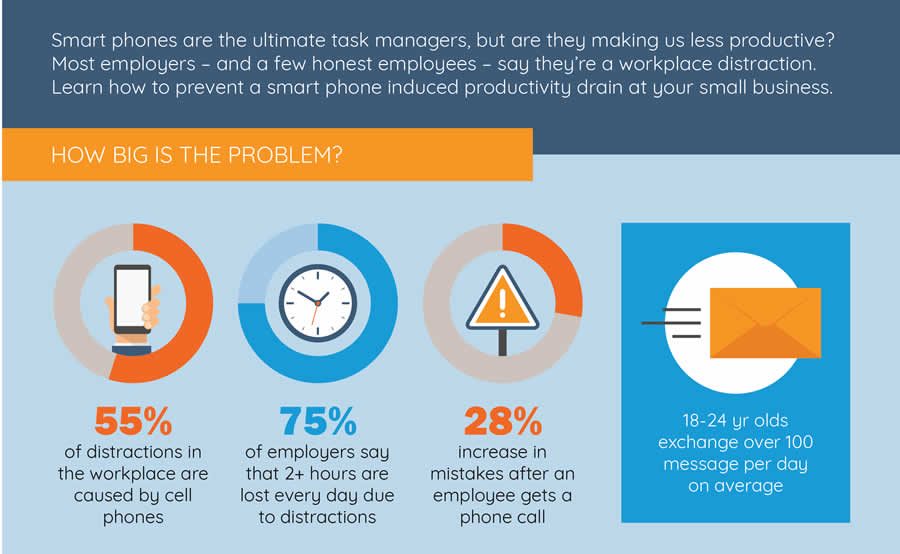
Download Our Free eBook 21 Days to Be a More Productive Small Business Owner.
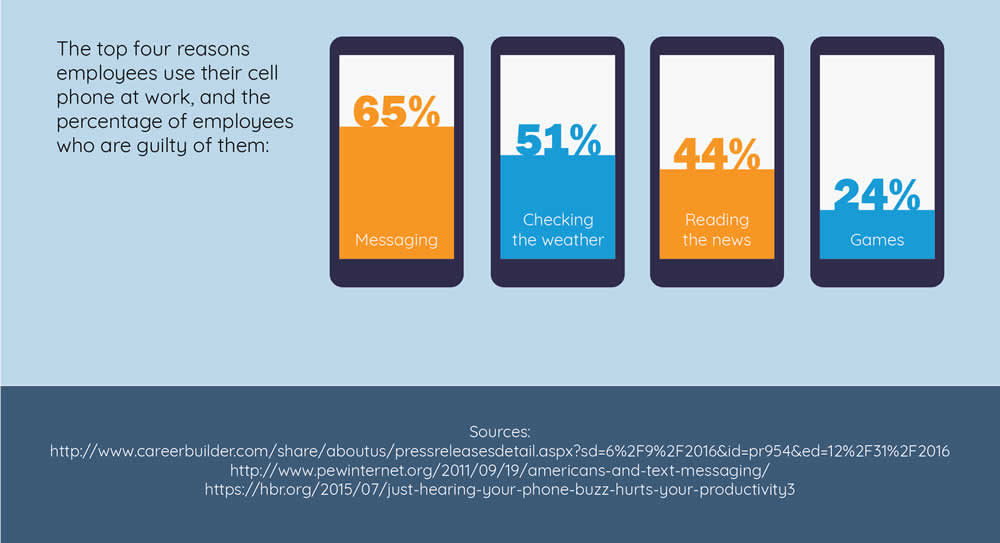
How to Deal with Overuse of Personal Cell Phones in the Workplace
Due to the habit-forming, ubiquitous nature of cell phones, small business owners must address their inevitable presence and intervene when employees are loath to put their devices aside — just as they must take action with the employee who always calls in sick. Below are a few tactics to help you exert some measure of control over cell phones in your workplace.
Face the Reality
Cell phones are here to stay. Although a device-less environment may be your workplace ideal, it is no longer a realistic expectation. Ninety-five percent of Americans now own a cell phone of some kind, and family-friendly employers know that even though work comes first and foremost, personal devices are vital for employees who need to check in with their children and attend to important personal matters during the day.
Unless there are safety concerns, banning cell phones from the workplace can be perceived as punitive and lead to morale problems. And although blocking cellular signals within your workplace may be a tempting solution, it’s not practical. Disabling Wi-Fi can impede your own business communications, and a cell phone jammer, which can effectively shut down signals throughout your business area, is not only dangerous, it is also illegal in the U.S.
Better to accept cell phones as a part of modern-day work life and establish policies for their use. As long as you enforce the policies you put in place, you should see usage settle at levels that are reasonable for your business.
Set Limits
You may choose to set limits on cell phone use that depend on the nature of your business, each employee’s job and the types of issues you’ve experienced. For example, cell phone use is typically prohibited under the following circumstances:
- During meetings, training sessions and conferences
- When employees are interacting with customers
- In production areas and kitchens or while operating heavy equipment as a cell phone can present a safety hazard
- While driving, except when a Bluetooth connection is available or when the driver is pulled over to the side of the road. (This is a requirement enforced by OSHA, the federal Occupational Safety and Health Administration, for which you are legally responsible as an employer.)
Your cell phone policy could also define:
- When it’s acceptable to use a cell phone during the work day, such as during breaks and lunchtime
- The frequency and length of calls permitted during working hours
- If headsets are permitted
- Where to store personal devices. Keeping phones out of sight, such as in a desk drawer, is an effective way to keep distractions to a minimum.
- Appropriate use during business hours. For example, business calls and brief conversations or texts with family members may be okay, but playing games or downloading music is not.
Just make sure that the limits you establish are fair and flexible. You can always tighten up your policies if necessary.
Define Cell Phone Etiquette
Not only do cell phones distract their owners, but calls can be especially annoying to the employees sitting close to the talker. These guidelines can minimize disruptions and help keep the peace, even when employees are on their phones:
- Set cell phones to vibrate and ringtones to silent
- Speak quietly
- Keep calls short
- Take personal calls in private
- Avoid offensive language
- Use texting as a quick and quiet alternative to talking on the phone
- Do not use cell phone cameras (to protect everyone’s privacy)
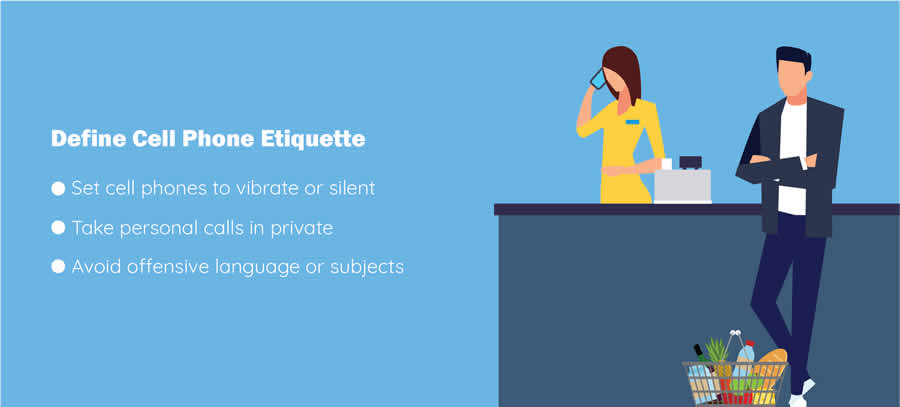
Put Your Cell Phone Policy In Writing
To ensure that your policy for appropriate cell phone conduct is understood and followed, put it in writing. Spell out your terms in clear, unambiguous language,along with the rationale for each, such as to ensure safety or maintain productivity. Include the disciplinary actions that will follow if policy terms are violated. This could include multiple stages (verbal warning, written warning, and final warning) and may include a cell phone ban if usage interferes with business operations and the possibility of termination if use causes an accident or violates the company’s confidentiality policy.
Require all employees to review and sign the policy, indicating that they understand the policy terms and the consequences of violations.
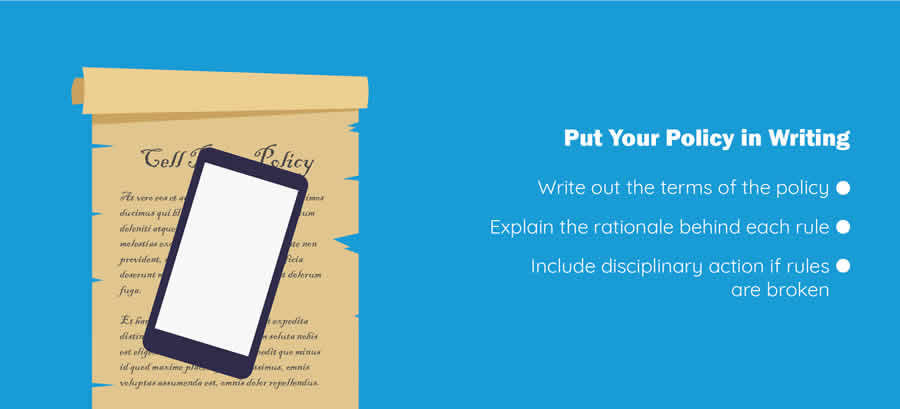
Lead by Example
If you want your employees to adopt new cell phone habits, you must be impeccable in modeling the behavior you wish to cultivate. If you’re taking personal calls or texting during meetings, your employees won’t take your cell phone policy very seriously. Be a stellar role model, and your employees will be more likely to follow suit.
Enforce Your Policy
Enforce your policy consistently and uniformly. Simply walking around the workplace can be an effective way of curbing cell phone use, but beware of overdoing it. Hovering can be perceived as micromanagement, breeding resentment among employees and ultimately backfiring.
You may need to issue daily reminders at first. If problems persist after a provisional period of time and cause workplace disruptions or a decline in productivity, it may be time for a more serious conversation with those employees whose cell phone habits are more entrenched.
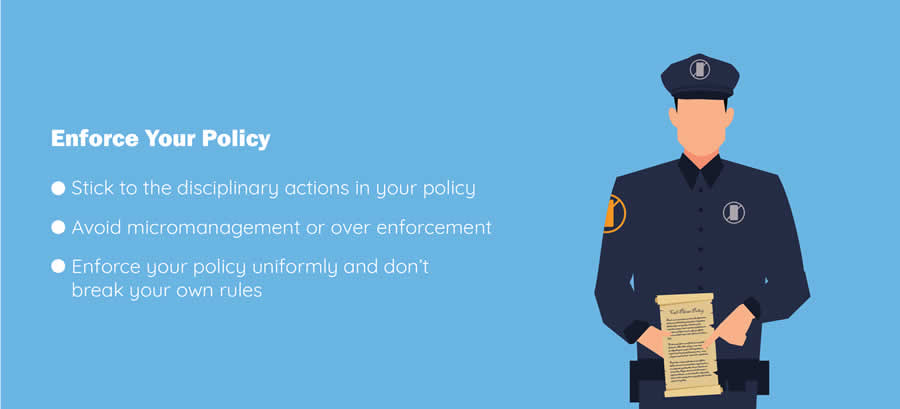
Take Disciplinary Action
When taking disciplinary action, follow the standard progression of issuing a verbal warning, written warning and final warning before terminating an employee. Document your discussions thoroughly, and be as fair as possible in order to reduce the risk of legal repercussions. The Hartford’s Small Business Owner’s Playbook shares some professional HR best practices you might consider if termination becomes necessary.
Next Steps: Are you interested in learning additional ways to manage your employees more effectively but don’t have time to keep up with the latest research and trends in talent management? We’ve got you covered with the weekly Small Biz Ahead Newsletter. Sign up today and start receiving tools, insights and resources to help you run a successful business.
Vilash Khatri

